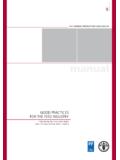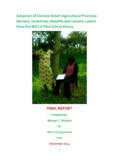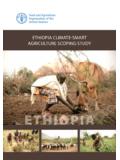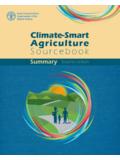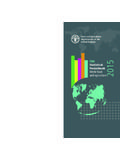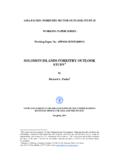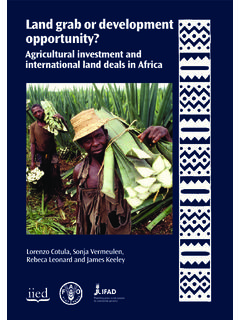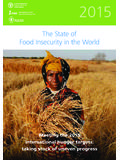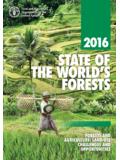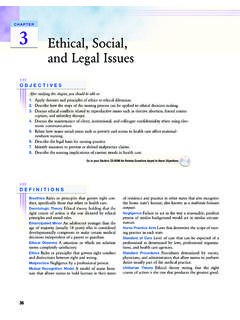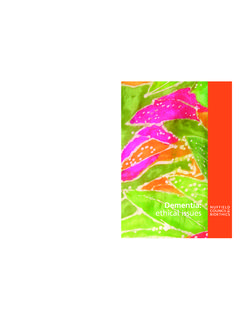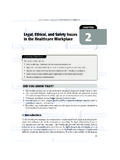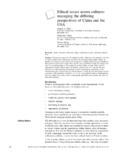Transcription of Ethical issues in - fao.org
1 FOOD AND AGRICULTURE ORGANIZATION OF THE UNITED NATIONSRome, 2005 Ethical issues in fisheriesFAO ETHICS SERIES4 The Organization acknowledges the contribution of Vilhj lmur rnason, Devin Bartley, Serge Garcia, R bert H. Haraldsson, Dagfinnur Sveinbj rnsson and Hiromoto Watanabe to the preparation of this by the Editorial Production and Design GroupPublishing Management ServiceFAOISBN 92-5-105322-7 FAO 2005 The designations employed and the presentation of material in this information product do not imply the expression of any opinion whatsoever on the part of the Food and Agriculture Organization of the United Nations concerning the legal or development status of any country, territory, city or area or of its authorities, or concerning the delimitation of its frontiers or boundaries.
2 All rights reserved. Reproduction and dissemination of material in this information product for educational or other non-commercial purposes are authorized without any prior written permission from the copyright holders provided the source is fully acknowledged. Reproduction of material in this information product for resale or other commercial purposes is prohibited without written permission of the cop y right holders. Applications for such permission should be addressed to the Chief, Publishing Management Service, Information Division, FAO, Viale delle Terme di Caracalla, 00100 Rome, Italy or by e-mail to role of ethics7 Main Ethical issues in fisheries12 Institutional frameworks16An Ethical analysis of fisheries27 Conclusion28 ReferencesFAO/17099/M.
3 MARZOTvSince ancient times, fisheries have been an important source of food, employment, and economic and social benefits, as well as a foundation for great cultures. That there are limits to the extraction of fishery resources has long been recognized by science, but policies and management have failed to consider them adequately, leading to regrettable environmental and socio- economic consequences. It is now globally clear that fisheries resources can no longer sustain the historical rapid and often uncontrolled exploitation and development rates, and that new management and conservation approaches are needed. A number of FAO Conferences, the United Nations Conference on Environment and Development (1992), the Millennium Assembly of the United Nations (2000) and the World Summit on Sustainable Development (2002) have raised awareness of growing concerns.
4 To date, the policy and management issues related to fisheries resources, such as overfishing, bycatch and discards, food quality, safety on board, illegal fishing, endangered species, resource allocations and fishing rights, have been explored largely from ecological, technological and socio- economic standpoints, while the Ethical components of these issues have been addressed implicitly at best. The most advanced and complete policy framework and reference for global fisheries is the Code of Conduct for Responsible Fisheries, adopted in 1995 by the FAO Conference. Although the Code has been elaborated mainly from technological, social, economic and political perspectives, it contains a number of less explicit, but nonetheless fundamental, Ethical considerations and addresses both human and ecological concerns directly.
5 Today, Ethical concerns related to the well-being of humans and the ecosystem are central to the debate about the future we want for fisheries and fishers. A global view of ethics is emerging. Human health and well-being and basic human rights, such as the right to food, are considered along with environmental stewardship and the intrinsic values and alternative uses of natural resources and the environment. Attention to these concerns has been increasing, and will continue to increase, in part as a response to trends in a number of spheres, among which are demographic change; the situation of the resources and their associated ecosystems, including increased fishing pressure and environmental degradation; progress in science and technology, encompassing aquaculture development, biotechnology and genetic engineering, and the so-called information revolution ; and social Forewordviand economic evolution worldwide, exemplified by globalization, the increasing role of the market and the concentration of economic power.
6 The timely Ethical issues in fisheries is the fourth study in the FAO Ethics Series. In order to address the Ethical issues broadly raised by FAO in food and agriculture, with a particular focus on fisheries, this document suggests and elaborates ways to implement the Ethical principles drawn from agreed international instruments on fisheries and ecosystems. The discussion outlines the main Ethical issues in fisheries and the moral imperatives to which they give rise, considers the role and scope of ethics in this context and recalls briefly the institutional foundations of fisheries policies as reflected in the Code of Conduct for Responsible Fisheries. It presents a holistic Ethical approach to fisheries, paying special attention to the effects of fisheries management and social policy upon people s living conditions.
7 Concrete examples and case studies are provided to support or illustrate the themes the twenty-first century, fisheries will see a further increase in the impact of the Ethical dimensions of fishing and natural resources management on fisheries development and environmental conservation. The objective of this document is to stimulate reflection on ethics in fisheries, with an eye to initiating and supporting a process leading to a better and more widely shared and accepted understanding about the role of ethics in the sector and about possible ways forward to address the issue. FAO intends to continue advancing the Ethical discourse pertaining to food and agriculture, including fisheries and aquaculture, as a component of its efforts to secure sustainable utilization of aquatic living resources and food security for all people in the world in the current and future generations.
8 Jacques Diouf FAO Director-GeneralFisheries and fishing policies deeply affect the living conditions of people in many parts of the world. Since ancient times, fishing has been a very important source of food, employment and economic and social benefits, as well as a foundation for great cultures. Despite centuries-old recognition that natural common resources can be depleted, fishery resources were, until recently, treated de facto as if inexhaustible, with little regard for environmen-tal consequences. In the face of growing international demand for fish and fish products, world fisheries became a market-driven and dynamically developing sector of the food industry.
9 From the early 1970s, and with the adoption of the United Nations Convention on the Law of the Sea (UNCLOS) in 1982, coastal states endeavoured to take advantage of new opportunities to develop their newly acquired exclusive economic zone (EEZ), investing heavily in modern fishing fleets and processing factories. However, during this period it became globally clear that fisheries resources could no longer sustain the rapid and often uncontrolled exploitation and development, and new approaches of conservation and environmental consideration would be needed (FAO, 1993). Awareness increased rapidly with the United Nations Conference on Environment and Development (UNCED) in 1992, the Millennium Assembly of the United Nations in 2000 and the World Summit on Sustainable Development (WSSD) in 2002.
10 The need to integrate bio-ecological, socio-cultural, legal, institutional and techno- economic considerations into discussion on fisheries resources has been widely accepted. An effort is now being made to articulate the Ethical dimensions of the sustainable development of fisheries as an important part of this awareness. The degree to which fisheries act responsibly should be judged against the principles and criteria of the sustainable use of natural renewable resources and, in particular, their contribution to human and ecosystem well-being. Evidence indicates that, in many areas, fishing management is failing on both counts (Cochrane, 2000). In some cases, fish stocks have collapsed, and the majority are at the limits of their biological productivity or are severely overutilized (Garcia and Newton, 1997; FAO, 2005a).

